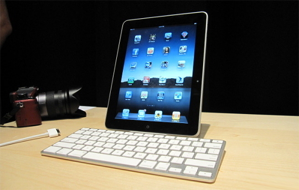 Nancy Nardin of Smart Selling Tools recounts the technological changes that have revolutionized how we sell and business as we know it in The Evolution of Sales Tools and the Efficiency Paradox. She talks of technology introductions that slowed us at first, but shortly after led to increased efficiency and productivity.
Nancy Nardin of Smart Selling Tools recounts the technological changes that have revolutionized how we sell and business as we know it in The Evolution of Sales Tools and the Efficiency Paradox. She talks of technology introductions that slowed us at first, but shortly after led to increased efficiency and productivity.
"We are at the beginning of yet another sales tool revolution: one that will be even bigger and more 'evolutionary' than the first. It will change the way we collect, record, and share information. It will change the way we communicate and collaborate. It will free us even further from our modern day drudgery allowing us to gain greater efficiencies, and therefore generate even more revenue. However, like other technological advancements of the past and present, the advancements of the future will introduce new consumptions of time, and in the short term, tax both our patience and productive output. Learning (and adapting to) new processes, forming new habits and behavioral patterns, and managing the use of these new technologies, will off-set any efficiency gains-to a degree."
When we look at important technology advancements over the past five years, there are two predominant things that stand out: mobile and cloud computing. Nardin speaks of these technologies throughout her blog and even when discussing the paradox. Although, as technology has adapted, so has the user experience. Gone are the clunky manuals for hardware electronics, or the machines with so many buttons that you will never know what they all do. Today, is marked by Apple's "one-button" interface and laptop GUI interfaces where users can drag and drop. So, when it comes to cloud and mobile, the newest mainstream technologies of our age, it is no surprise that the learning curve for efficiency has been heavily decreased.
For the user, the cloud does not mean more work, as learning the typewriter or PC (referencing Nardin's article). We are still storing in the same essential hardware, yet it is no longer local and now made accessible through all your machines. Input has not changed for the user, just for the creator of the technology. With mobile, the "efficiency paradox" again is no longer so prevalent. Our smart phones are just more accessible mobile computers in the palm of our hands. We interact with differing gestures, but the use and rational are the same.
When it comes to both the cloud and mobile technology revolution in business, it is this lack of "efficiency paradox" that makes Salespod[Now Repsly] so powerful. Relearning a new technology to create efficiency has disappeared with this new tool. Rather, we are adding more efficiency to technology (computers) that business owners know very well. Mobile sales tracking, mobile crm, and mobile workforce automation still require an advancement in technology, yet the "efficiency paradox" has all but disappeared.


 Nancy Nardin of Smart Selling Tools recounts the technological changes that have revolutionized how we sell and business as we know it in
Nancy Nardin of Smart Selling Tools recounts the technological changes that have revolutionized how we sell and business as we know it in 

